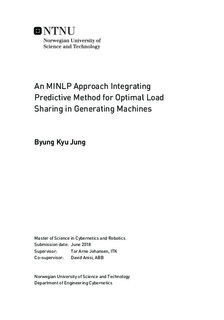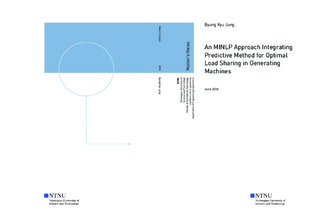| dc.contributor.advisor | Johansen, Tor Arne | |
| dc.contributor.advisor | Anisi, David | |
| dc.contributor.author | Jung, Byung Kyu | |
| dc.date.accessioned | 2019-09-11T11:43:56Z | |
| dc.date.created | 2018-06-04 | |
| dc.date.issued | 2018 | |
| dc.identifier | ntnudaim:18536 | |
| dc.identifier.uri | http://hdl.handle.net/11250/2616141 | |
| dc.description.abstract | Gas turbines and diesel engines have generally been used in the Oil & Gas industry. As the amount of energy required for the operation is large, the efficiency of power plant operation has been subject to many works conducted recently. Moreover, the interest of integrating alternative sources of energy is increasing as the alternative energy sources do not cause any undesirable consequences to the environment. This paper proposes a method for operating the power and energy plant in an optimal manner. The main focus is achieving cost-efficient operation of the plant. As the power plant on a petroleum site will require large volumes of fuel, reducing a small fraction of the fuel usage will have a huge impact on the environment in terms of reducing the greenhouse gas emissions as well as the total operating cost. The current practice of using the generating machines is based on the principle of equal share . The main idea of equal share is to share the total load equally between the generating machines. However, this practice is not optimal considering the efficiency of the fuel usage. To perform load sharing in a more cost optimal manner, energy management system algorithm based on mixed integer non-linear programming is proposed. The future power demand is predicted using a machine learning method. The predicted power demands are given as a set of the parameters that are used by the energy management system algorithm. The optimal load distribution is scheduled based on the predicted future power demand, in a predictive control manner. An important performance parameter in order to obtain the optimal load sharing will be Brake Specific Fuel Consumption. The optimal load computation system proposed in this work is integrating gas turbines, grid electricity, and energy storage system. The possibility of integrating other energy sources, e.g., windmills and solar panels is of future consideration. Energy management system algorithm is implemented using the proposed model to perform simulation and the result will be compared and discussed. The findings from the simulations yield total cost saving of 2-2.48 % | en |
| dc.language | eng | |
| dc.publisher | NTNU | |
| dc.subject | Kybernetikk og robotikk, Navigasjon og fartøystyring | en |
| dc.title | An MINLP Approach Integrating Predictive Method for Optimal Load Sharing in Generating Machines | en |
| dc.type | Master thesis | en |
| dc.source.pagenumber | 124 | |
| dc.contributor.department | Norges teknisk-naturvitenskapelige universitet, Fakultet for informasjonsteknologi og elektroteknikk,Institutt for teknisk kybernetikk | nb_NO |
| dc.date.embargoenddate | 2021-06-04 | |

